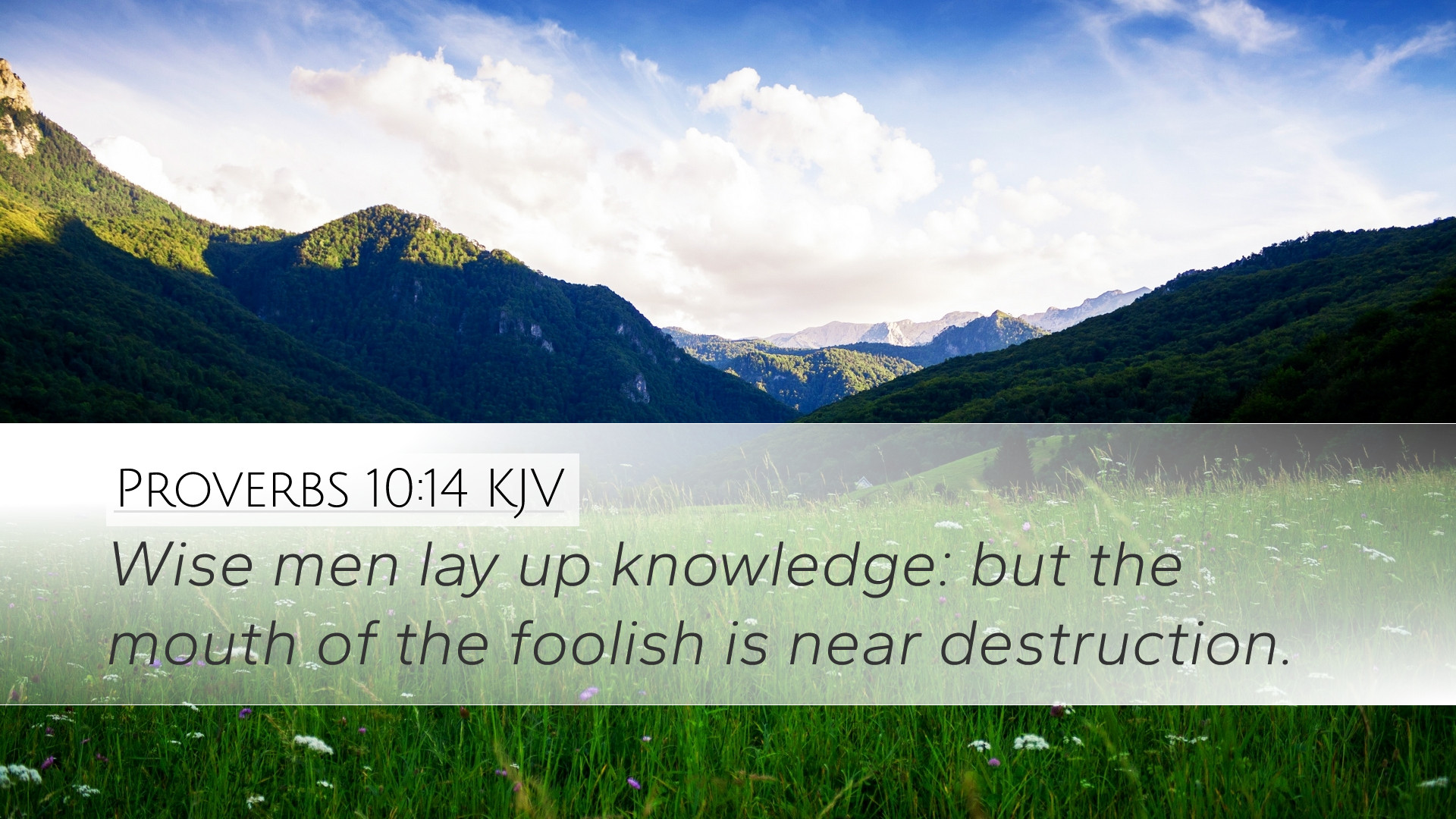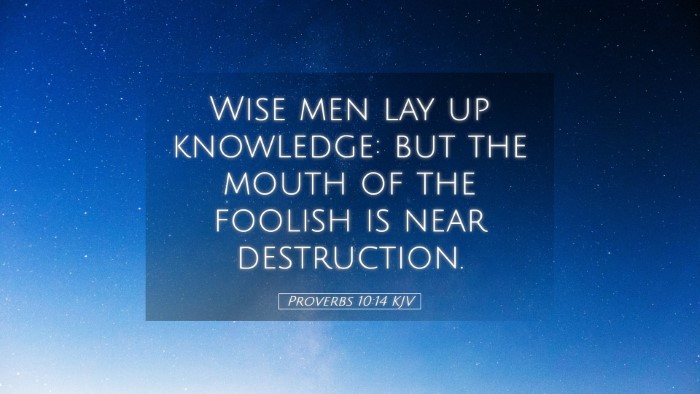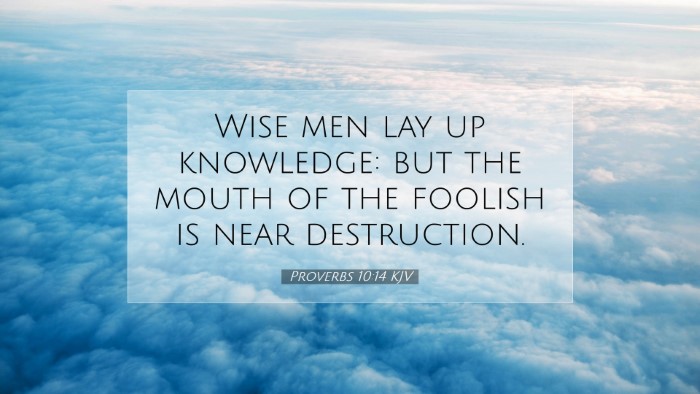Commentary on Proverbs 10:14
Verse: "Wise men lay up knowledge: but the mouth of the foolish is near destruction." (Proverbs 10:14, KJV)
Introduction
This proverb contrasts the behavior and outcomes of the wise and the foolish, offering profound insights into the nature of wisdom and folly. The verse invites readers, particularly pastors, students, and theologians, to consider the importance of knowledge and the consequences of its neglect.
Commentary Overview
This commentary synthesizes the works of esteemed public domain theologians, including Matthew Henry, Albert Barnes, and Adam Clarke. Each offers a distinctive perspective on the implications of this verse, ultimately converging on the critical theme of the value of wisdom.
Insights from Matthew Henry
Knowledge as a Storehouse: Matthew Henry emphasizes that wise individuals “lay up knowledge” much like hoarding valuable treasures. This act of accumulation requires diligence and foresight. Wise men seek wisdom and understanding and know that it is a resource that will serve them well throughout life. The image of laying up knowledge suggests preparation for future challenges.
The Nature of Wisdom: Henry observes that such wisdom is not merely academic; it is practical and applicable to daily life. True knowledge manifests itself in righteous living and good judgment. Therefore, the wise individual does not only seek knowledge but integrates it into their life.
Contrast with Fools: The latter part of the verse, referring to “the mouth of the foolish,” portrays the contrast starkly. Henry points out that fools often speak impulsively without consideration of the impact of their words. This heedlessness can lead to “destruction,” not only for themselves but potentially for those around them. Henry asserts that wisdom leads to preservation, while folly leads to self-destruction.
Insights from Albert Barnes
The Dual Path of Wisdom and Folly: Albert Barnes expands on the opposing paths of the wise and the foolish. He notes that wisdom is not merely an abstract quality but is tied to knowledge and its application. Wise individuals treasure their understanding, ready to draw upon it in times of need.
Folly as a Destructive Force: Barnes elaborates that the “mouth of the foolish” signifies the unfiltered, often reckless speech of those who lack understanding. This tendency often results in chaos and destruction. He draws attention to the idea that such foolishness often leads to ruin, both for oneself and possibly setting a course of destruction for others.
Encouragement to Seek Wisdom: Barnes urges readers to earnestly pursue wisdom. The imperative here is not just to avoid foolishness but to actively engage in the pursuit of knowledge. He highlights that in seeking wisdom, one finds peace and safety, leading to a bountiful life.
Insights from Adam Clarke
Storing Knowledge: Adam Clarke's interpretation underscores the proactive nature of wisdom. He explains that “laying up knowledge” suggests a continuous, deliberate effort to acquire and internalize wisdom. Clarke emphasizes that this is a conscientious process of learning, indicating the importance of discipline and a love for learning.
The Consequences of Ignorance: Clarke warns against the pitfalls of ignorance as depicted through the actions of the fool. For he believes that the “mouth of the foolish” acts as both a source of turmoil and a mirror reflecting their inner emptiness. Clarke’s analysis points towards the idea that unwise speech often emits ignorance, causing personal and communal strife.
Application in Daily Life: Clarke encourages readers to apply this wisdom in their daily conversations and decision-making. Understanding that words have power, and folly produces negative consequences, serves as motivation to carefully cultivate knowledge and wisdom.
Theological Implications
Christian Wisdom: Theologically, Proverbs 10:14 emphasizes a deep reverence for God as the foundation of wisdom. True wisdom, according to the Scriptures, is a gift from God, as noted in James 1:5. This further correlates with the necessity of knowledge in the life of a believer who wishes to navigate the complexities of life wisely.
Practical Applications: This verse has profound implications for pastoral ministry, teaching, and discipleship. Understanding the necessity of both knowledge and its application in life should motivate pastors to guide their congregations toward both biblical literacy and practical living that reflects God’s wisdom.
Conclusion
Proverbs 10:14 serves as a powerful reminder of the contrast between wisdom and folly. Combining the insights of Matthew Henry, Albert Barnes, and Adam Clarke highlights the necessity of actively pursuing knowledge and the perils of neglecting it. In a world rife with distractions and the rapid dissemination of information, believers are called to be discerning and wise. By laying up knowledge, they secure a foundation that leads to resilience and peace in the face of adversity.
As leaders, scholars, and earnest seekers of God’s truth, the call to wisdom remains ever relevant. May this insight spur us toward a deeper understanding and application of God’s Word.


